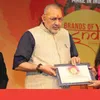How this Mumbai-based beverages brand clocked Rs 25 Cr turnover in just 3 years
In a span of just 24 months after brand launch, Storia Foods & Beverages managed to enter 52 cities across India hitting 50,000 retail outlets. Here’s the story of their disruptive journey.
The global food & beverage industry is growing at around five percent a year and global expenditure on food products by consumers is expected to reach $20 trillion by 2030.
And becoming a prominent part of this huge industry is the health food segment. As people’s opinions evolve and knowledge in public domains increases, consumers are looking for the best to feed themselves and their families. They seek healthier alternatives to what they eat and drink, thus spurring the emergence of a lucrative pocket of organic, sustainable, and healthy food and beverages companies.

Vishal Shah, Founder and MD, Storia Foods & Beverages Pvt. Ltd
And Indian brands are not too far from capitalising on this health trend too. Storia Foods & Beverages’ Vishal Shah launched the brand in 2016 to offer convenience, sustainability and inspire a healthier lifestyle through nutrition-charged products.
In an interaction with SMBStory, he explains why he started up in the health food segment of the F&B industry.
My family is into the food business for the last 25 years and I know the lack in the industry. Hence, I decided to start my own brand to provide people with healthy drinking beverages without any preservatives.”
Edited excerpts of the interview
SMBStory: How was Storia started?
Vishal Shah: Storia Foods & Beverages Pvt. Ltd was established as an independent company in 2016 in Mumbai. Along with Storia, the group has been a part of the B2B food industry for 25 years and are forerunners of speciality spray-dried ingredients in India.
Coming from a family business that has been into manufacturing and innovating food ingredients, the idea of ‘creating’ something new was always fascinating along with an aspiration of impacting lives and giving back to the society.
By gaining invaluable insights from the Indian food fraternity through various innovations in the past, the resolve of making India a nutritionally stronger nation with healthier, convenient food offerings grew stronger.
My chemical engineering background opened up a Pandora’s box of what technology could achieve and with this, the vision to disrupt the food industry with innovative products and technologies that could add ease, create value, and inspire a healthier lifestyle led to Storia.
SMBS: What technology do you use to develop the beverages? How many SKUs do you manufacture and from where?
VS: At present, Storia deals in four SKUs, including coconut water, which was our first launch. Then we came up with fresh fruit juices, shakes, and beverage whitener (milk powder).

Storia's range of products
The products are developed through aseptic technique and there are no preservatives added in the liquid that can be consumed within six months from the date of packaging without refrigeration storage. Our juices and shakes have high fruit content and are packaged in bottles under cold conditions.
We currently sell our products from two main channels: B2B which includes institutions and hotel, restaurant, and cafe (HoReCa) segment, and B2C which includes traditional trade, modern trade, and ecommerce.
In a span of 24 months, we are able to enter 52 cities in India hitting 50,000 outlets in retail. We recorded a turnover of Rs 23 crore in FY 2018-19.
SMBS: Where do you manufacture these beverages and from where do you source materials?
VS: Storia has its own manufacturing unit in Chhindwara, Madhya Pradesh. We also have two manufacturers for coconut water, who co-pack the product. One is in Tamil Nadu and the other is in Kolhapur.
We source raw materials from across the world. For example, we import coffee and chocolate from Singapore, strawberry from Spain, and source Alphonso mango, almonds, and saffron from within India.
As we strongly believe in providing quality products we source materials from the regions known for them. Our coconut water is now being recommended by doctors and is available in many chemists shops and gyms.
SMBS: What are the challenges you face in terms of sustaining the business?
VS: It takes a lot of time and consistent efforts to build a brand. We are still at a very nascent stage with our journey towards building one. What one needs to realise is that a brand must not only be built for the consumers, but also for the trade, for the retailers, for the vendors, and all stakeholders associated with it. It takes a lot of time to gain their trust and this would only happen if we delivered what we promised time and time again.
India is a very price-sensitive market. Also, the government has a long way to go to streamline regulations for startups if it wants to meet its targets for startups in India. Since the brand’s inception, we have undergone various hurdles with finding apt technology, the demonetisation, economic slowdown, and various external factors.

Besides, the battle for shelf space is always going to be a huge monster for all FMCG companies. Though modern trade and ecommerce have made the entry barrier a lot more relaxed, 77 percent of the market is still into traditional trade today and brands like us that have the vision to go big will have to strive to get a share of that shelf space. That is where innovation is key and being on the forefront of the attitudinal shift of the consumers becomes important.
SMBS: What is your advice to people who want to set up their business in the same sector?
VS: There is a massive attitudinal shift in how today’s consumers approach food. From the nutritional value it offers and how transparent a brand is about what’s in their food to the source of ingredients, the consumers are keen to know every detail. Three major emerging trends in the food industry in the near future would be sustainability, wellness, and convenience.
Like nutrition, sustainability will become an expectation that companies will have to offer their consumers. These will not only include access to recycling but also incentivising consumers to recycle packaging, and offering upcycled goods will be on the rise as well.
Expectations on convenience when it comes to food and drinks will continue to rise in this ‘on-demand’ age. With the hectic pace of modern life and higher disposable incomes, consumers are willing to pay more to save themselves time.
Consumers also demand products that are natural and offer functional benefits more than high fat, high sugar and ‘empty calories’. This offers great opportunities for companies that harness food science and technology developments to deliver revolutionary products.
SMBS: What are your future plans?
VS: In terms of numbers, our immediate plan is to strengthen our distribution and be available at one lakh retail touchpoints across the country. We are also focusing on our brand communication with the trade and consumers to be able to build a brand for the long run. We are also looking to have a global footprint through our exports.
With a research and development-driven product portfolio, our impetus is to innovate products that are not only delicious but also convenient, affordable, and inspire a healthier lifestyle. We would look to disrupt the existing food and beverage categories in the country with products that offer sustainability, meet the on-the-go demand and work towards building a nutritionally stronger India.
By FY 2020, we are looking to grow 65 percent, and by 2022, we want to grow by 92 percent.
(Edited by Evelyn Ratnakumar)









